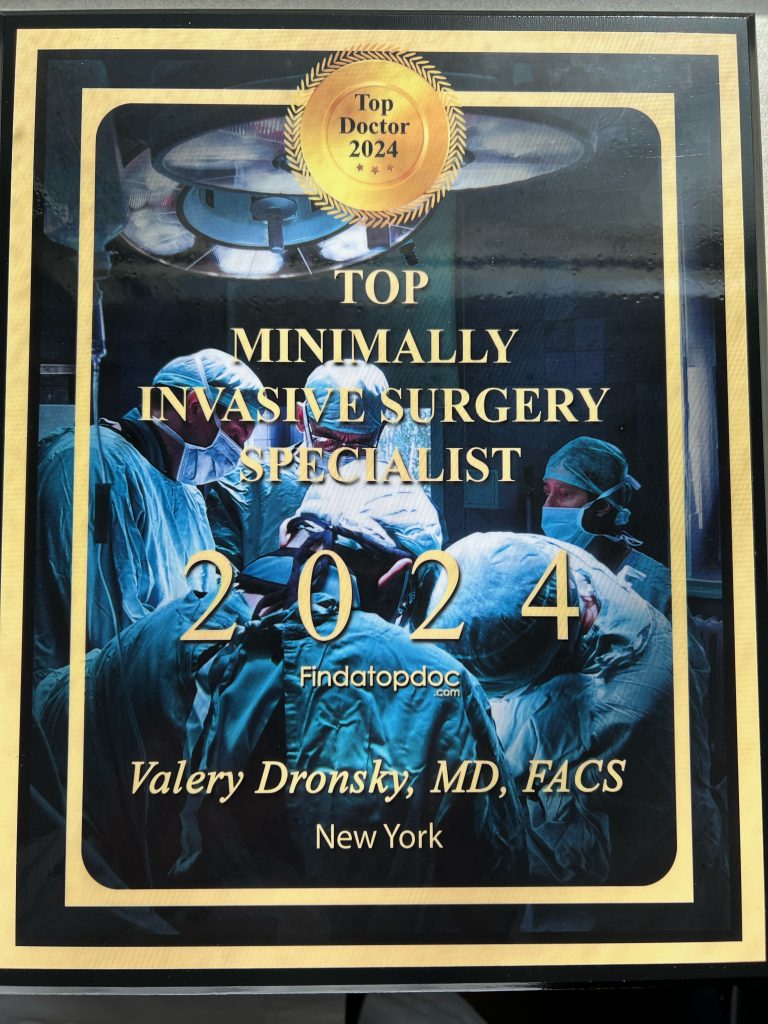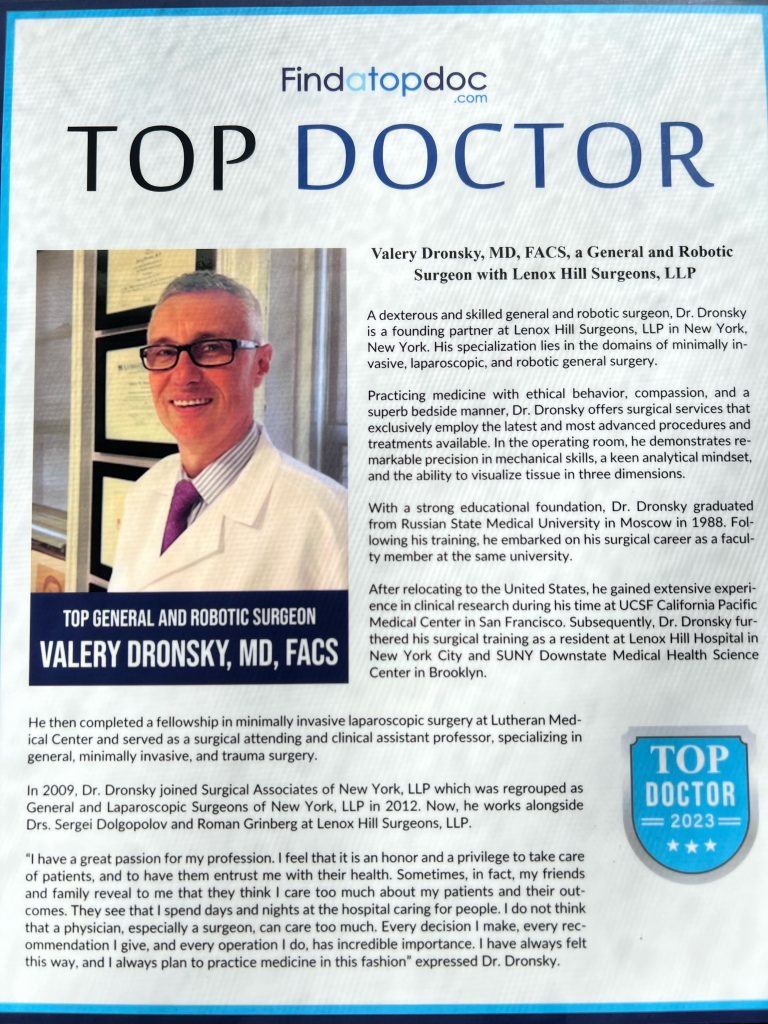CALL TODAY 646-846-1136 | EMAIL
Surgical Experts Dedicated to Improving Lives
At Lenox Hill Minimally Invasive Surgery PLLC, Dr. Valery Dronsky and his staff of medical professionals provide compassionate care with the highest ethical & professional standards. In our state of the art facility, we offer surgical services using only the most cutting edge and current procedures and treatments. We specialize in general surgery, including extensive experience in performing hernia repair surgery. Our expertise is in minimally invasive surgery and robotic surgery. Minimally invasive and robotic surgery often allow patients to experience easier recovery than traditional open surgery. They also allow for more precise and less traumatic surgery. When robotic and minimally invasive surgery is not an option, we are also skilled and experienced in traditional open surgical procedures.
Dr. Dronsky is an experienced and highly skilled surgeon having undergone extensive training in school, residency and fellowships. He practices medicine with ethical behavior, compassion and superb bedside manner. In the operating room he exhibits precision mechanical abilities, analytical thinking and the ability to visualize tissue in three dimensions. These innate and learned skills allow Dr. Dronsky to be one of the most dexterous and skilled professionals in New York City and the Country.
Call us: 646-846-1136
PATIENT TESTIMONIALS
Recent Awards
We are honored and deeply appreciative to have consistently received prestigious awards and recognition year after year, establishing us as one of New York’s foremost hospitals for a wide range of general surgeries, safety measures, specialized procedures, and overall excellence in healthcare. At Lenox Hill Minimally Invasive Surgery, our unwavering commitment lies in delivering exceptional care and unwavering support to our patients, guaranteeing their safety and successful recovery throughout their entire surgical experience.
Hospital Quality Awards
 America’s 50 Best Hospitals Award™ (2023, 2022)
America’s 50 Best Hospitals Award™ (2023, 2022)
Top 1% in the nation for providing the highest clinical quality year over year.

America’s 100 Best Hospitals Award™ (2021)
Top 2% in the nation for consistently delivering clinical quality year over year.

America’s 250 Best Hospitals Award™ (2023, 2022, 2021)
Top 5% in the nation for consistently delivering clinical quality.

Patient Safety Excellence Award™ (2023, 2022)
Top in the nation for providing excellence in patient safety by preventing infections, medical errors, and other preventable complications.
Specialty Clinical Quality Awards

America’s 100 Best Hospitals for Cardiac Care Award™ (2023, 2022, 2021, 2020, 2019)
Superior clinical outcomes in heart bypass surgery, coronary interventional procedures, heart attack treatment, heart failure treatment, and heart valve surgery.

America’s 100 Best Hospitals for Coronary Intervention Award™ (2023, 2022, 2021, 2020, 2019)
Superior clinical outcomes in coronary intervention procedures (angioplasty with stent).

America’s 100 Best Hospitals for Prostate Surgery Award™ (2023, 2022, 2021)
Superior clinical outcomes in prostate removal surgery and transurethral resection of the prostate.
Click to see all of our Healthgrades best doctors awards




Visit our main website at www.LenoxHillMinimallyInvasiveSurgery.com
Blog Posts are Below:
Monthly Archives: January 2020
Hernias & Surgery
Sometimes, a fatty tissue or part of an internal organ squeezes through an opening in the surrounding muscle. This phenomenon results in hernia occurs. Most commonly, the internal tissue protrudes through a weak spot in the muscular wall of your lower abdomen. However, hernias may develop in many other locations in your body.
A hernia patient may observe a lump or swelling in the stomach region but feel no pain. That’s because most hernias cause no pain and only appear as a bulge. However, increased pressure in the abdominal muscle wall –due to obesity, persistent coughing, or pregnancy –may enlarge the hernia.
Types of Hernia
Some hernias are present at birth time and may go away before the infant is one year old. Adults are also susceptible to develop hernia. Some of the common types of hernias include:
Inguinal hernia
Men are five times more susceptible to inguinal hernia than women. It is the most common hernia accounting to 75% of all hernias. An inguinal hernia occurs when the intestine or in rare cases the bladder, protrudes into the groin through the inguinal canal.
Femoral hernia
Pregnant and obese women are more likely to develop a femoral hernia. When the intestine enters the canal containing large blood vessels (the femoral artery and vein), it results in hernia. The canal is located between the abdomen and thigh. Thus, the bulge appears in the upper thigh, groin, or hip.
Hiatal hernia
This type of hernia occurs when a part of the stomach slips upward through openings in the diaphragm and extends into the chest. Hiatal hernia is linked with “gastroesophageal reflux disease” (GERD) that causes heartburn.
Umbilical hernia
It occurs when the intestine bulges into the abdominal wall through the navel. An umbilical hernia is mostly found in newborns and disappears with time. However, it may develop in obese men and women with multiple pregnancies.
Incisional hernia
33 percent of patients who undergo abdominal surgery are likely to develop an incisional hernia. It occurs when the muscle underlying the treated area pulls apart, letting the internal structures pass through the weak spot.
Symptoms
Not all hernias are painful or show visible symptoms. In most cases, the patient only experiences a lump. Or the skin surrounding the bulge becomes sensitive. Likewise, not all hernias need surgeries. However, a hernia becomes “incarcerated” when tissue or intestine gets trapped in the abdominal wall.
In extreme situations, incarceration may strangulate your organs. Thus, the blood supply to your intestine and tissues is cut off, thereby causing the intestine to die. The condition calls for immediate medical help and surgery.
Hernia Repair Surgeries
The purpose of a surgical hernia repair is to relieve the pain and push the bulge back to the right place, thereby strengthening the muscle area. Hernia repair is one of the most common and shortest surgical procedures in the world. The surgical options for enlarged hernias include:
Open Surgery
For open surgery, the patient is given general anesthesia. The surgeon makes an incision of around 2.5 to 3 inches around the surrounding the hernia. The doctor may push the hernia back into the abdomen, tie it off, or gently remove it.
Once the procedure is over, the surgeon closes the area with stitches. In the case of large hernias, doctors place a piece of mesh over the hole for extra support. Thus, the mesh keeps the hernia in place, reinforcing the weakened muscle.
Minimally Invasive Surgery
In minimally invasive surgery, also called laparoscopy, the surgeon inflates a harmless gas in the abdomen. The gas helps the doctor to look at the structure and organs closely. The surgeon then goes for a series of small incisions near the hernia.
He/she then inserts a thin tube with a small camera (laparoscope) into one of the cuts. The captured images serve as a guide for the surgeon to treat the hernia. The laparoscopy is performed with general anesthesia, and people tend to recover sooner with this procedure as compared to open surgery.
Final Word
Whether you require traditional open surgical procedure or minimally invasive surgery, Lenox Hill Minimally Invasive Surgery is the right place in NYC. Our compassionate team of surgeons meets the highest ethical and professional standards. Book your appointment today and consult the best surgeons in the town.
Spleen Problems
Do you have spleen problems? The spleen is a soft, spongy organ that rests under your rib cage in the upper left portion of the abdomen toward the back. The spleen is normally equal to the size of the fist and is an integral part of the lymph system. This small organ defends your body in multiple ways.
- First, the spleen filters your blood and removes the damaged blood cells from the bloodstream.
- Also, it produces white blood cells, thereby preventing the body against germs and bacteria.
- Spleen houses the red blood cells and platelets that help your blood clot.
Spleen Problems: What is Splenomegaly?
Sometimes, the spleen gets larger than its size, which may affect either of the functions it performs. As a result, the enlarged spleen or splenomegaly, starts filtering not only the damaged blood cells but also the healthy cells in your bloodstream. This causes a reduction in the number of normal blood cells in your body.
Also, the excessive red blood cells and platelets may obstruct your spleen and affect the functioning adversely. Sometimes, a physical examination may not be enough to feel the spleen. However, certain diseases may result in a swollen and enlarged spleen. It is important to know that an enlarged spleen does not always indicate a problem. Rather, it might signal an overactive spleen.
Symptoms of Spleen Enlargement
Sometimes, an enlarged spleen causes no signs or clear symptoms. However, some people may experience discomfort or pain in the upper left side of the abdomen radiating to the left shoulder. Your spleen may become so large that it presses on your stomach. As a result, you may feel full without eating or only eating a small amount.
When the enlarged spleen exerts pressure on the other organs, it affects the blood flow to the spleen. Thus, the spleen may not be able to work actively. The removal of too many blood cells due to abnormal spleen functioning may cause anemia. Also, the low count of white blood cells may expose you to infections more often.
Causes of Splenomegaly
The enlargement of the spleen may cause several infections and diseases. Some of the main causes of enlarged spleen include:
- Bacterial infections, such as syphilis
- Parasitic infection, for instance, malaria
- Viral infection like mononucleosis
- Liver diseases
- Hemolytic anemia
- Metabolic disorders
- Blood cancer
- A blood clot in the spleen or liver
Treatment
A ruptured spleen may cause bleeding in the abdominal activity that may prove fatal. It is paramount to get medical help for the enlargement of the spleen. You can’t afford to leave an enlarged spleen untreated as it may lead you to serious medical issues.
Most of the times, treating the root cause of spleen enlargement may help evade the removal of the spleen. For instance, if the spleen enlargement is a result of an infection, the doctor may prescribe antibiotics. Shrinking the spleen through radiation may save you from spleen removal.
Splenectomy
However, if the doctor fails to identify the main culprit, or the case is severe, then the surgeon may remove the spleen through splenectomy. For the procedure, the doctors prefer minimally invasive surgery to open surgery. Hence, for removing the spleen, the surgeon marks several small incisions. With the help of laparoscopy, the doctor then removes the enlarged spleen.
You are required to be extra cautious after the spleen removal surgery as it makes you susceptible to contract infections more often. Hence, you may not be able to fight the bacteria effectively. However, vaccines, certain medicines, and antibiotics may help reduce the risk of infection post-surgery.
Final Word
Your spleen is a small but integral organ of your body, and the enlargement of spleen may have drastic effects on the functioning of it. Therefore, it is vital to your health to seek professional help for your major and minor spleen problems.
Contact Lenox Hill Minimally Invasive Surgery today and schedule an appointment with the best surgeons in NYC for spleen removal.















